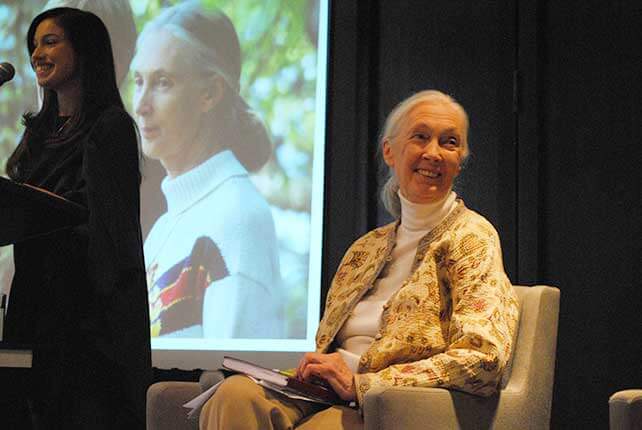Ask chimpanzee expert Jane Goodall for an example of how nature can be resilient, she surprises her Canadian audience with one simple word: Sudbury.
“If you look at pictures of what it was like in the old days, with copper and tin mining, it was devastation. It was terrible. I heard people couldn’t breath,” she says, speaking at a closed-door event held recently in Toronto. Sitting beside her was close friend and internationally renowned wildlife artist Robert Bateman.
“To get to the outhouse, they would have to tie a rope from the house to the outhouse and follow it on really bad days.”
But Sudbury is now a “beautiful” example of how a place that was once destroyed can come back to life, she adds, pointing to the return of the peregrine falcon.
Her comments are timely, given that a recent report from Statistics Canada found Sudbury residents the happiest in the country. When asked to rate their life satisfaction from a scale of zero to 10, about 45 per cent of people living in Greater Sudbury picked nine or 10, indicating very high satisfaction. It was the highest response rate of any city.
The connection between nature and happiness formed a big part of Goodall’s and Bateman’s discussion, which was organized by the Jane Goodall Institute as part of efforts to find corporate sponsors for its youth-focused Roots & Shoots program.
Goodall, who is a UN Messenger of Peace, says she suffers “extreme despair” at times when thinking about the pollution humans have inflicted on the planet and the crippling poverty of those most affected. Climate change also gets her down, and the signs are all around: summer temperatures during a Nebraskan spring, spring-like winters in Utah, persistent drought in California, and flooding in the United Kingdom.
“This pattern is replicated everywhere I go in the world,” she says. “All of this is pretty gloomy, but what I always give as my first reason for hope is the young people” – and she’s encouraged by the numbers that showed up at the New York climate march last September.
Bateman agrees that the energy, drive and optimism of younger generations are ingredients for hope, but he laments how too many are shifting away from nature.
“We are nature, but we seem to be denying it,” he says. “The average kid spends 7.5 hours a day, seven days a week, looking at a screen.
“How much time does the average kid in society spend in nature? None. How much time did kids spend in nature in all previous generations? All the time.”
The full conversation can be viewed below by clicking on the video, which was made available to Corporate Knights courtesy of event sponsor Loblaw Companies.







